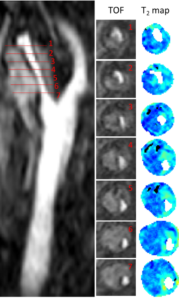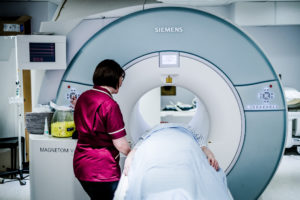Researchers at the University of Oxford, supported by the NIHR Oxford Biomedical Research Centre, have developed a new type of MRI scan to predict the risk of having a stroke.
The non-invasive technique, developed with funding from the British Heart Foundation (BHF), is described in a paper published in the journal JACC: Cardiovascular Imaging. It produces a quantitative result that can accurately indicate whether plaques in the carotid arteries, which supply the brain with blood, are rich in cholesterol, and therefore more likely to cause a stroke.
The rupture of fatty plaques can block the arteries and cause potentially debilitating and life-threatening strokes as the brain is starved of oxygen. There are more than 100,000 strokes in the UK each year, around a quarter of which are caused by carotid plaques.
Latest figures show that stroke now costs the UK healthcare system an estimated £2 billion every year. It is estimated that stroke costs the UK as much as £9 billion a year as a society.
At present, the risk of stroke is measured by the size of the plaque in the carotid artery. If the plaque is deemed to be too big, people are treated surgically to remove it. However, this method can miss fatty plaques that are not big, but have a high risk of rupturing.
The new MRI technique was developed to differentiate between the risky plaques that contain a lot of cholesterol, and those that are more stable.
In the study, the researchers used the new MRI scan to measure the amount of cholesterol in the carotid plaques of 26 patients scheduled for surgery. After the plaques were surgically removed, the team looked at the actual cholesterol content in each plaque and found that the new technique was accurate and the more cholesterol they detected within the plaque, the greater the risk.
The team have confirmed and extended their findings in another study on 50 people, published in PLOS ONE.
The work was a collaboration between researchers at the University of Oxford and surgeons working at the John Radcliffe Hospital, and was supported by the NIHR Oxford BRC and the BHF Centre of Research Excellence in Oxford.
 One of the authors, Dr Luca Biasiolli, from the University of Oxford, said: “Stroke is a leading cause of disability and the third biggest killer in the UK. When someone goes to hospital having suffered a minor stroke, it’s vital that doctors know whether the patient might be at risk of a further stroke, which could be fatal.
One of the authors, Dr Luca Biasiolli, from the University of Oxford, said: “Stroke is a leading cause of disability and the third biggest killer in the UK. When someone goes to hospital having suffered a minor stroke, it’s vital that doctors know whether the patient might be at risk of a further stroke, which could be fatal.
“Being able to quantify cholesterol in carotid plaques is a really exciting prospect, as this new MRI technique could help doctors to identify patients at higher risk of stroke and make more informed decisions on their treatments.”
Professor Sir Nilesh Samani, Medical Director at the BHF, which part-funded the study, said: “When someone suffers a mini-stroke, they often go on to suffer a more serious, or even deadly, stroke in the hours, days or weeks that follow. This exciting research opens up the possibility that in the future we may be able to more accurately identify people with carotid plaques that are likely to rupture and cause a stroke.
“These patients can then be treated earlier, for example with surgery to remove the plaque, while others might be spared surgery altogether. More research is now necessary before this advance can come into routine clinical practice. However, if successful this technique has the promise to save lives.”
The researchers were also supported by The Engineering and Physical Sciences Research Council (EPSRC), the Medical Research Council (MRC), Stroke Association, Wellcome, and Dunhill Medical Trust.
